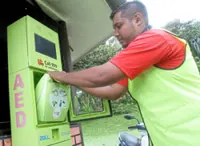Until Jio Rodriguez was wheeled into the operating room for open-heart surgery last Valentine’s Day, he’d never seen his brother Brian Rodriguez cry.
But February was a month of exploring the heretofore unknown for Jio, who until then never gave his health – and especially not his heart health – much thought.
Why should he?
He was 21, a college senior with graduation and job prospects on his mind.
And on that first evening of February, he was playing basketball with friends in the fitness center at Central Connecticut State University in New Britain, Connecticut, United States.
Meanwhile, in the athletic centre next door, his school’s basketball team, the Blue Devils, was playing the Red Flash of Saint Francis University.
On any other evening, that game wouldn’t be as important to Jio and his teammates as their own game.
But it turned out to be the first coincidence, the first domino, the first fortuitous turn of fate that would end up saving Jio’s life.
“The crazy part,” Jio said, “is that if there hadn’t been a game going on, there wouldn’t have been police officers there.
“They’re the ones who did CPR (cardiopulmonary resuscitation) and used the AED (automated external defibrillator) on me.”
As Richard Homestead, a lieutenant on Central Connecticut’s police force and one of those officers, said, “It was a perfect storm for Jio.”
Not only were Homestead and two other officers working during the game, two more were serendipitously there – Wayne Perritt was responding to another, less serious medical call, and Pamela Young was making a routine patrol of the facility.
Signalling for help
Midway through the Blue Devils game, a staff member from the fitness center ran in, frantic and screaming that a young man had collapsed on the basketball court.
“Initially, we thought maybe someone had had a seizure,” Homestead said.
“We went running over and found Jio face down and unresponsive.”
Their training kicked in, the choreography that comes from preparing to restart a heart that’s been stopped by a cardiac arrest.
“The AED said shocking was advised,” Homestead said, “which we did. Still no pulse.”
The officers continued CPR until they detected a pulse and Jio began to breathe on his own.
He was rushed to the hospital; three days later, he regained consciousness.
“My first memory was waking up surrounded by family and not knowing what was going on,” Jio said.
Initially, neither did doctors.
At one point, Covid-19 was suspected, then a stroke.
Medical teams told him his case was one of a kind.
“It was a bit scary,” Jio said, “being one of a kind.”
Finally, images of his heart showed three aneurysms, weak spots in the walls of blood vessels that cause them to bulge.
His cardiologist concluded they were caused by Kawasaki disease, which creates inflammation in blood vessels – particularly those that support oxygen in the heart – and causes murmurs and cardiac irregularities.
His condition necessitated triple bypass surgery, which took place on Feb 14, 2024.
He remembers tightly holding the hand of each of his parents as he was wheeled down the hall to the operating room and looking into the tear-filled eyes of his brother Brian, a nurse at that hospital.
Graduating as scheduled
For days after the surgery, Jio felt like he was being stabbed in the chest.
Days were endless; nights were sleepless.
Yet, slowly, he improved.
He received an implantable cardioverter defibrillator in his chest as a safety net.
If the device detects a problem, it can shock the heart back into a normal rhythm.
When Jio finally had an appetite, he craved his mother’s cooking.
She brought him comfort foods like pork with sweet sauce, a Filipino breakfast dish from his family’s native country.
Despite his pain and adjusting to a completely new life, Jio was determined to graduate on time.
He had kept in touch with his professors, working online for two months and then back on campus. Friends carried his books and backpack; others gave him rides to and from home or walked him there and back.
“Nothing like having your heart stop to remind you how precious the gift of life is,” Jio said.
“It’s terrifying, terrifying, terrifying when I look back on it.”
Instead, he focuses on looking forward.
He goes to cardiac rehabilitation and has begun paying close attention to what he eats.
His dad bought him a watch to keep up with his heart rate, which he does diligently.
Jio also adopted a puppy, a Labrador and Dalmatian mix named Milo that he walks regularly.
His cardiac appointments have gone well; he should have no repercussions from what happened, his doctors tell him.
In May, Jio walked three miles (4.8km) in the American Heart Association’s Greater New Haven Heart Walk and gave a talk about what had happened to him.
That’s when, for the first time, he met – in what Homestead described as “kind of an emotional meeting” – the three officers who had saved his life that cold February night.
A week later, Homestead and Young were there when Jio graduated from college.
Young took a picture of the young man, in his cap and gown, whose life they had saved.
Homestead especially cherishes Jio’s positive outcome because he knows firsthand that CPR – as miraculous as it has been known to be – isn’t always enough.
During his lifetime in law enforcement, he’s performed CPR about a half-dozen times, he said.
Jio was the first to survive.
“I try not to get caught up in my work,” Homestead said, “but sometimes I just can’t help it.” – American Heart Association News/Tribune News Service




